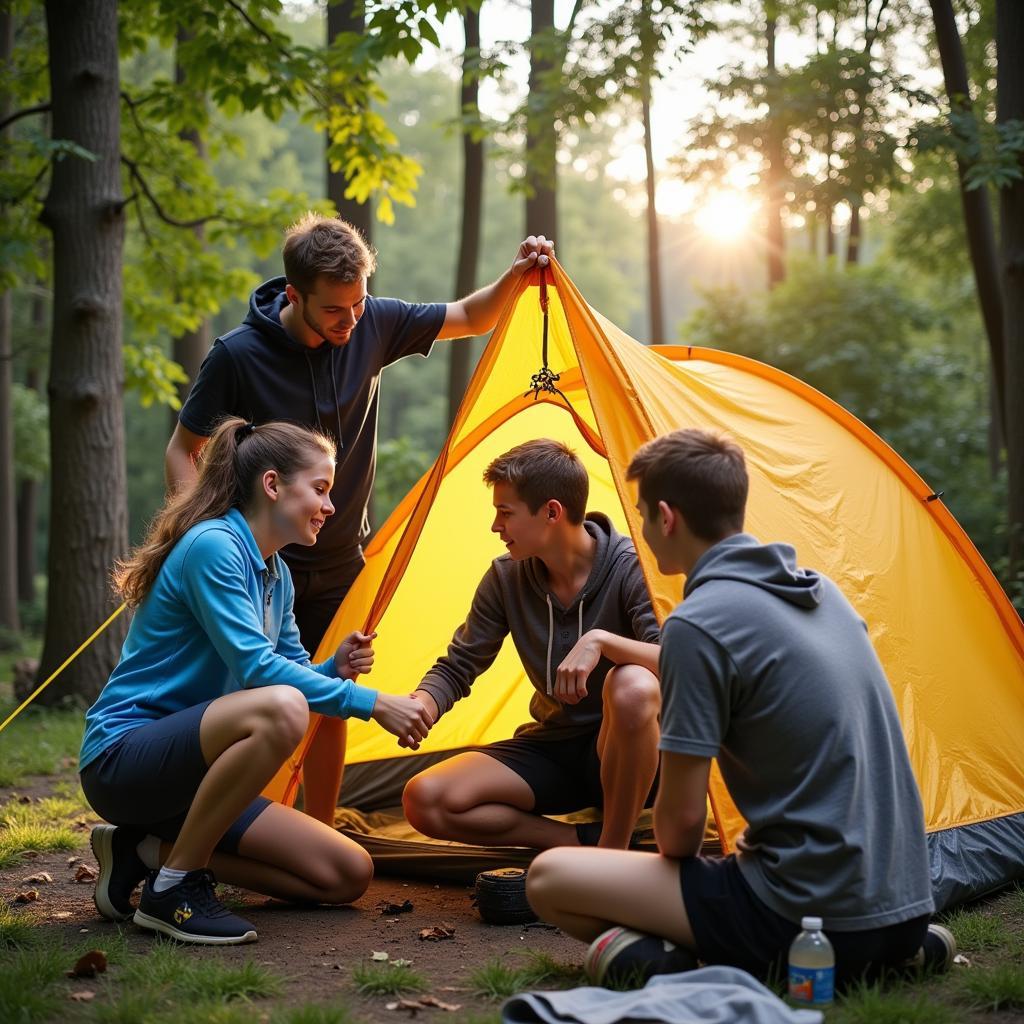Camping, an engaging activity that brings us closer to nature, is becoming increasingly popular. However, to ensure a truly fulfilling and safe trip, “camping skills” are indispensable. More than just pitching a tent and making a fire, camping skills encompass a wealth of knowledge and soft skills necessary to confidently overcome challenges and fully enjoy the beauty of the wild.
The Importance of Camping Skills
You might think camping is as simple as finding an empty space, pitching a tent, and starting a fire. However, reality is not that straightforward. Camping requires careful preparation, from planning and packing equipment to handling unexpected situations that may arise during the trip.
It is precisely when facing challenges that soft skills like teamwork, problem-solving, and adaptability truly come into play, helping you overcome difficulties and create memorable experiences.
Essential Skills for Camping
1. Planning and Preparation
A successful camping trip always begins with detailed planning. You need to clearly define:
- Camping location: Camping skills will help you choose a location suitable for your abilities and preferences.
- Timing: Consider the weather, work schedule, and other factors to choose the appropriate time.
- Number of participants: Affects tent selection, food quantity, and task distribution.
- Budget: Helps you control spending and choose suitable services.
After planning, start preparing essential equipment such as tents, sleeping bags, food, water, cooking utensils, flashlights, etc. Camping skills album can provide you with a complete list of necessary items.
2. Tent Pitching
Pitching a tent is the most basic skill when camping. Make sure you are familiar with how to pitch the type of tent you bring. Pitch the tent on level ground, away from dangerous areas such as cliffs and streams.
3. Fire Starting
Fire is essential for cooking, warmth, and insect repellent. Learn how to safely start a fire by using the right kind of wood, starting a fire in a safe place, and always having fire control measures.
4. Cooking and Food Storage
When camping, you can prepare your own meals by cooking on-site. Bring easy-to-prepare and store food items.
5. Basic First Aid
Accidents are inevitable during camping. Therefore, you need to equip yourself with basic first aid knowledge to handle minor injuries yourself or assist injured people while waiting for help.
6. Environmental Protection
As responsible tourists, you need to be aware of protecting the surrounding environment. Collect waste, do not break branches or pick flowers, and maintain general hygiene in the camping area.
Soft Skills – Key to a Successful Camping Trip
Besides hard skills, soft skills also play an extremely important role, helping you overcome challenges and fully enjoy your trip.
1. Teamwork
Camping is often a group activity, requiring smooth coordination among members.
2. Problem Solving
During camping, you may encounter unexpected situations such as bad weather or lack of equipment. Summer camp survival skills, especially problem-solving skills, will help you calmly find appropriate solutions.
3. Adaptability and Flexibility
Camping is an outdoor activity, you need to be ready to adapt to changes in weather, environment, and schedule.
 People discussing how to handle unexpected situations while camping
People discussing how to handle unexpected situations while camping
Conclusion
Camping skills are not innate; they require continuous learning, practice, and experience. Start by participating in short camping trips near home to accumulate experience. And remember, a spirit of curiosity, thorough preparation, and a mindset ready for adaptation are key to conquering all challenges and turning each camping trip into a memorable adventure.
FAQs about Camping Skills
1. What types of clothes should I bring when camping?
You should bring comfortable, sweat-absorbent clothes, windbreakers, raincoats, hats… Depending on the location and weather, you can choose appropriate clothing.
2. How to store food when camping?
You should use coolers, insulated bags, and tightly wrap food… to avoid insects and animals.
3. What should I do if I encounter wildlife?
Stay calm, do not approach or feed them. Find a way to leave the area safely.
4. What should I do if I get lost?
Stay put, try to signal for help, and wait for someone to assist you.
5. Which locations are suitable for beginners?
You should choose planned camping sites with support services and close to residential areas.
Need Support?
Contact us!
Phone Number: 0372666666 Email: [email protected] Address: 55 To Tien Thanh, Hanoi.
We have a 24/7 customer care team ready to assist you!